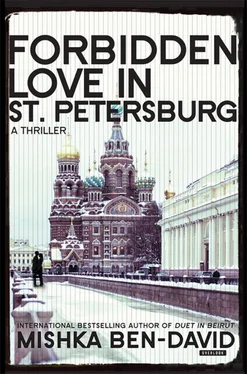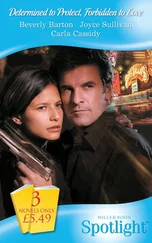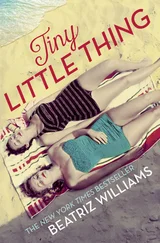But I’m not qualified to operate in hard-core enemy territory, in ‘target states’, I tried my luck with him.
As far as we are concerned the Gulf states are not hard-core enemy territory, so you can’t really call them ‘target states’. They are not Syria or Iran. They are open to Westerners, even to Israelis. Anyway it’s worth your while to start familiarizing yourself with the Gulf, Morocco, Tunisia, countries that are defined at most as ‘soft targets’–you’ll have lots of work there in the future.
Can that be after the two years are over?
Maybe. But this operation is urgent. Your men are waiting for you.
I had no basis for hoping that intimidation of the target would have the desired effect. There was also no point in suggesting that we simply leave him badly wounded, something which, unconsciously, I had striven for in previous operations. I set off with a heavy heart, yet also in the knowledge that there was no alternative.
And so one more virtual notch was added to the handle of the pistol I never wore or wanted to wear.
The architectural monstrosities of glass and steel that sprouted out of the white sands appeared to be a futuristic mirage, as did the green golf courses in the heart of the desert. These attracted western businessmen along with millionaires who wanted to buy a piece of land on one of the artificial islands built along the shoreline. All of this made it easier for us to blend into the local scene.
Rooms were booked in the hotel in which our target was staying. In temperatures as high as 40 degrees in the shade we didn’t even want to think of carrying out the task outdoors. We’ll do it in real style, said Levanon, who I was happy to be working with again. A liquidation in the air-conditioned presidential suite in a bath with golden taps.
That’s also style, said Udi, pointing to two whores, wrapped from head to toe, including a veil, sitting on a sofa in the lobby. One of them joined me in the elevator, two smiling blue eyes peering at me from the blackness enveloping them. I wondered what she really looked like, but had to suppress my curiosity.
At night, with Udi’s help, I removed the naked and still wet body of Mustafa Quader–the mercenary scientist–and put it in his hotel’s garbage bin which was also a trash compactor.
On the flights to Europe and then home, I felt as if I was dreaming. The whole episode didn’t seem real to me.
News of the Pakistani nuclear scientist’s disappearance in the Arab Emirates didn’t make the headlines. With my stomach churning, I told Orit that I had been in a new area. I had only very partially come to terms with what I was doing, and was far from being able to say that I had truly accepted such operations, however much I might have thought them unavoidable.
BEFORE THE FINAL touches were made, we moved into our new little house on the fringes of the Arava village overlooking the date plantation and the mountains of Edom which straddled the Jordanian border. While our house was being built, the village secretariat had managed to tarmac the road between the two rows of houses, construct a pavement, and install street lighting. Some of our neighbours had long since finished building their homes; others were at various advanced stages of completion so that the tranquillity of the desert was only rarely disturbed by the noise of ongoing construction.
In a burst of enthusiasm Orit began to set up her desert architectural office and promoted her skills in the villages of the Arava as well as in the Negev’s various kibbutzim, which were in the process of expanding and absorbing young families. Our home became a show house for the few who were interested.
Once a week I made the trip to the university in Jerusalem and for the rest of the time I was free to help my father. It was as if he had been looking forward to this moment for many years. He simply dropped everything and handed over the reins to me. Mounting the tractor I felt that no time at all had elapsed since I last drove it through the open fields. I was back to being a born farmer.
My happiness was almost complete. That’s the only way I can describe the feeling that washed over me every morning as I went out to the fields driving the tractor. The sun had not yet risen over the mountains of Edom, so the chill of sunrise had not yet given way to the heat of its desert rays and the fields remained covered in dew. In the bright light of early dawn and its cool breeze, I drove the tractor and its trailer to where the farm’s Thai workers lived. Despite the balaclava hats covering their faces, I’d learned to recognize them all. In silence, they sat themselves down in the wagon and we headed for the open fields.
The Thai workers spread themselves out among the rows of vegetable plants while I attached a plough to the tractor and worked the bare land. During those hours I thought of almost nothing else. I threw myself into physical work and occupied myself with what the fields and the season of year demanded of me, sowing, tilling or reaping. However, so far as my happiness was concerned, ‘almost’ remained the right word to describe my state of being. This was because at any moment, just as Orit and I were moving from the insemination phase, which produced no results, to trying out the painful and frustrating procedures of IVF treatment, Rafi could call.
For two weeks every month Orit endured the misery of hormone injections. Given her experience of Chinese acupuncture these didn’t at first phase her. But as it became clear that we were only at the beginning of a painfully long process, her resistance to the pain of the jabs diminished. Her fear both of the needle and the pain made self-injection impossible so it was left to me to do it for her every day.
In the dim light of our bedroom after a day’s work in the fields, I prepared the syringe and its contents, gently uncovered her firm buttocks, bending over and looking for a spot that hadn’t yet been pierced. I kissed the chosen area trying to loosen the tension that had gripped her entire body and with an aching heart inserted the needle.
Orit sighed, pursing her lips. I felt the needle penetrating, feeling her pain. Tears welled up in my eyes as I wiped the tear spilling from hers. I put the syringe on the chest of drawers and slid between the sheets, hugging Orit and she, limply, embraced me. From time to time this closeness even led us to making love.
Orit wanted to continue the treatment at Hadassah Hospital where she’d been treated while we were living in Jerusalem. Given what lay ahead, the journeys there were spent in a tense silence.
The hospital was expected to notify us within a few days if there were any suitable embryos that could be transferred to the womb. These were days when we were afraid to hope but couldn’t avoid doing just that.
On the morning of the expected news from the hospital I left the Thai workers in the field and came home early, ready to take the call before Orit managed to get to the phone. Deep inside me I knew what the answer would be: I’m sorry to tell you Mr Ben-Ari, but there are no suitable embryos. I went up to Orit’s studio and found her sitting on the sofa, her face ashen, her eyes closed.
You don’t have to tell me. I know, she said. Your silence and your heavy footsteps on the stairs said it all.
She burst into tears. I knelt, taking her precious head into my arms. Perhaps next month, my dearest Orit, let’s believe. But all she could do was to weep silently. In the months that followed the outcome was the same.
The injections, which at first led to fleeting moments of intimacy between us, now turned into occasions of anger. When Orit’s strength had waned and she could no longer tolerate the extraction procedures, she asked that they be administered under a general anaesthetic from which she found it difficult to come around. She remained fuzzy-headed all the way home. Somehow we got through the nerve-wracking wait for the results of the fertilization. Orit tried to ease her anxiety by smoking. All I could do was comfort myself with the thought that at least she wasn’t drinking. Then the disheartening news would come, hurtling us both into an oppressive silence and Orit into a state of utter despair.
Читать дальше












